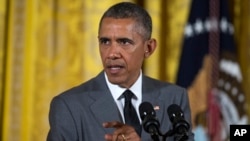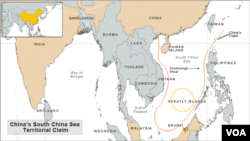President Barack Obama warned that Southeast Asia risks becoming less prosperous as countries in the region undertake land reclamation and assert sovereignty over parts of the disputed South China Sea.
Obama said that while some of China’s claims may turn out to be legitimate, it should stop “throwing elbows and pushing people out of the way” in pursuit of its interests.
Speaking to a gathering of young Southeast Asian leaders at the White House Monday, Obama said what has allowed the region to prosper in recent decades is relative peace and stability, including the freedom of navigation in the South China Sea.
"All of that is because there’ve been certain rules that everybody’s followed. Freedom of navigation requires that people observe basic conduct about this far off your territory is your territory. After that, it’s international waters," he said.
"If there’s a dispute, then there are international mechanisms to adjudicate that dispute. If you start losing that approach and, suddenly, conflicts arise and claims are made based on how big a country is and how powerful its navy is instead of based on law, then I think Asia will be less prosperous," Obama added.
US has no claim
He said that while the United States has no claim and is not a party to the regional dispute, it does, as a Pacific power, have a stake in seeing disagreements resolved peacefully, diplomatically and in accordance with international standards.
The president said land reclamation and aggressive actions by any party are counterproductive, and added that Washington will support those countries willing to work with the United States in establishing and enforcing norms and rules that will ensure future prosperity.
"And, the truth is, China is going to be successful. It’s big, it’s powerful. Its people are talented and they work hard, and it may be that some of its claims [in the South China Sea] are legitimate. But, they shouldn’t try to establish that based on throwing elbows and pushing people out of the way. If, in fact, their claims are legitimate, people will recognize them," Obama said.
China has indicated it has no intention of halting its construction efforts on disputed islands, saying it is in line with its sovereign integrity, and adding if it backs off, U.S.-led forces will become emboldened and take tougher positions against Beijing.
It has said no country values regional peace and development more than China.
Ankit Panda, co-editor of the regional current events publication The Diplomat, said Obama’s choice of words better described China’s 2012 naval confrontation with the Philippines over Scarborough Shoal or last year’s dispute with Vietnam over China’s construction of an oil rig in the Spratly Islands.
"What China’s doing with its land reclamation efforts is what I would describe as low-intensity coercion, at best. Contravening international law, threatening the freedom of navigation, all these are terms the United States has used in recent weeks and I think that’s a better description of what we’re seeing in the South China Sea," Panda said.
He said the major concern observers have is that China is preparing to announce the establishment of an Air Defense Identification Zone, ADIZ, as it did in 2013 over the East China Sea. He said that could impede the freedom of navigation and overflights.
Counterproductive
China analyst Scott Harold of the RAND Corporation said creation of an ADIZ in the South China Sea could prove counterproductive for Beijing in the expected hostile reaction it would receive from its neighbors.
"And, as we look back at the air defense identification zone that China established in the East China Sea a couple of years ago, as shocking and as inappropriate as that event was, it actually has not had much relevance for the way countries regard China’s East China Sea claims," Harold said.
"In fact, the U.S. immediately contested it. Japan also refused to acknowledge it. It has not assisted China in helping to lay claim to the Senkakus, or to force Japan to acknowledge the legitimacy of China’s claims," he said.
Harold said the South China Sea is a more widely shared body of water and more geostrategically important than the East China Sea, and that would result in creating enemies without achieving anything substantive.
During his remarks to young Southeast Asian leaders at the White House Monday, Obama welcomed China’s commitment to infrastructure investment through its Asia Infrastructure Investment Bank (AIIB).
He also said the success of the democratic transitions in Myanmar, also known as Burma, will depend in part on ending discrimination against the Muslim Rohingya minority.





